Holiday Wrap-Up
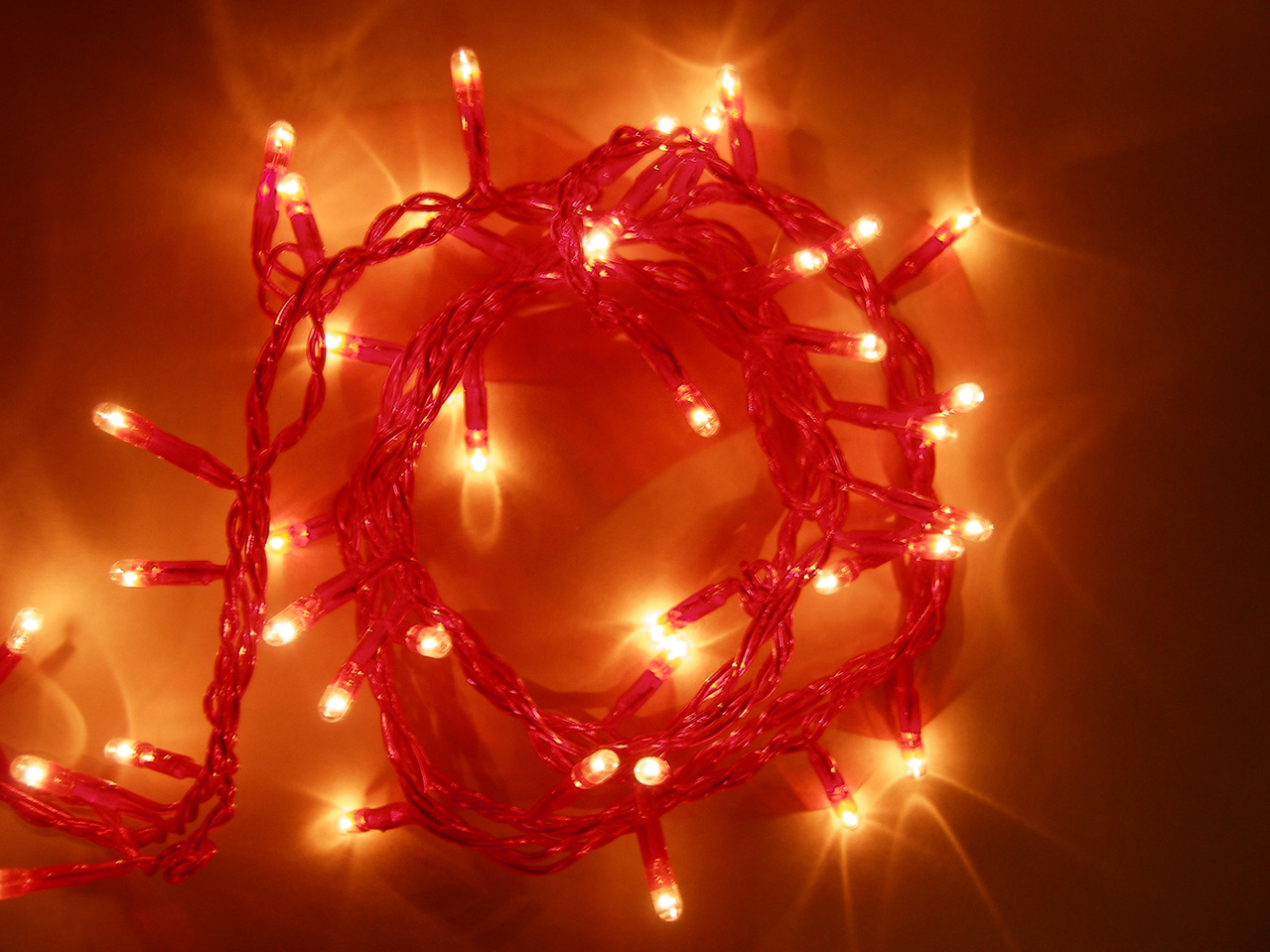
We provided ways to reduce waste and recycle during the holidays; as cleanup begins there are many ways reduce the amount of waste heading to the landfill and you can help others.
Christmas trees can be reused in your own yard; whole to provide birds some shelter or branches can be cut off and placed over perennial plants to protect again frost heave. Omaha provides recycling locations, click here for rules, updated locations, and hours—including the times when volunteers will be there to help unload.
If you are taking down outdoor lights and find they are dead or you don’t need all that you have, take them to Scrap Central, for free recycling. Remove all packaging, bags, twist-ties, and rubber bands and Scrap Central will recycle them, donating the proceeds to schools and firefighters.
While recycling is great, reducing and reusing is the best way to go. Did you or your kids get battery operated gadgets? Rechargeable batteries are worth the up front cost, both for your budget and the environment. If you upgraded your electronic devices, remember to repurpose or recycle the old ones.
Did you struggle to buy gifts for people on your list? Get gifts you don’t want or need? Maybe you have leftover canned or packaged goods bought for holiday cooking you didn’t end up using? Or struggle to find time to get it all done? Start talking to your family now about ways to make changes for next year; focus less on presents and more on your time and happiness.
Speaking of the gifts you don’t need, don’t throw them away or let them clutter up your home, donate them. Lots of people donate items during the holiday season, but the need is there year round, and especially when it’s cold outside.
Unopened toiletries (including hotel/travel size), scents, clothing, functional items, electronics, and non-prepared food can be donated to a variety of shelters and charities, including the VA Medical Center, Youth Emergency Services, Siena Francis House, Food Bank for the Heartland, Salvation Army, Paralyzed Veterans of America, Habitat for Humanity ReStore, Open Door Mission, just to name a few. Check out Donation Town to find a charity near you.
If you or your child received books and you need to make room on your shelf, don’t forget the Little Free Library!
image courtesy freeimages.com/mairakouvara
Plastic and Metal Recycling arrives at Village Pointe
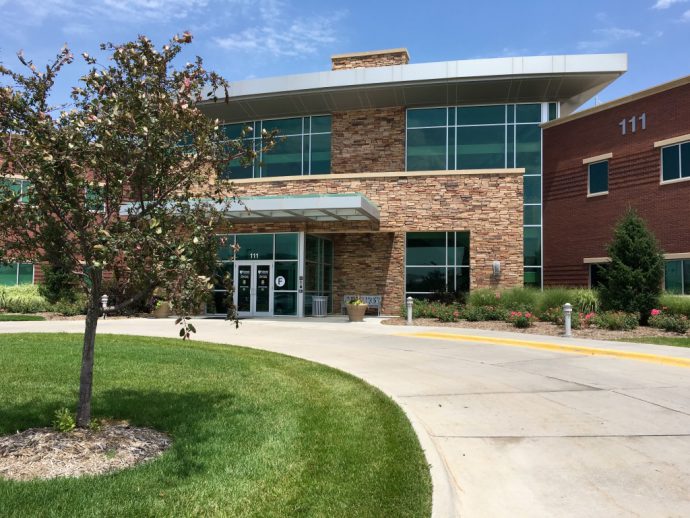
We are excited to announce the new recycling bins provided by grant from the Nebraska Recycling Council funded by the Nebraska Environmental Trust have come in and are in place at Village Pointe.
- Tall or short green bins for mixed plastic and metal
- Both of these bins will hold both metal and plastic, comingled. The plastic that goes in must be rigid—the number doesn’t matter, but the plastic must hold its own shape. e.g. pop bottles, plastic trays, frozen lunch plates, yogurt cups can all go in. Plastic bags, saran wrap, cellophane, bubble wrap cannot.
- Items need to be emptied of food and liquid prior to placing them in the bin but they don’t need to be super clean. Not every bit of food needs to be out or off, but the bulk should be removed—you can use the napkin you ate with to get the excess out and call it good.
- Clean patient care/work-related items can go in the bin as well. Examples include saline bottles, plastic jugs, etc. Tubing, items that have had patient fluids on them (even if they normally go in the trash), or items that look like medical waste cannot be placed in the containers. If you are not sure if it looks like medical waste, please consider it trash until you confirm with LiveGreen@unmc.edu
- Lobbies have stainless steel “triple bins”. They are all attached as one unit, but have 3 distinct bins: paper/locked/slot opening, landfill/square opening, mixed plastic and metal/round opening.
The bins must stay in the location they are placed in. We worked with colleagues in the space to determine where bins were needed and then found a location that meets code. If there is an issue with a bin location and you want to relocate it, please email LiveGreen@unmc.edu so I can verify the new location is acceptable.
If you see your Environmental Services workers, please thank them! This is a big change for them and they now have more containers/more work to do. They have willingly taken this on and are happy to help recycle! Also know that recycling bins aren’t emptied until they are ¾ full. This helps with efficiency but also decreases the number of plastic bags we have to use, an unfortunate side effect of recycling.
Thank you for your help in bringing recycling to Village Pointe and for your patience while we got the bins and service added there! We know other locations are recycling on their own and would like to see this change too. We are working on it and thank you for all your recycling efforts and patience.
Heartland B-Cycle Stations Now On Campus
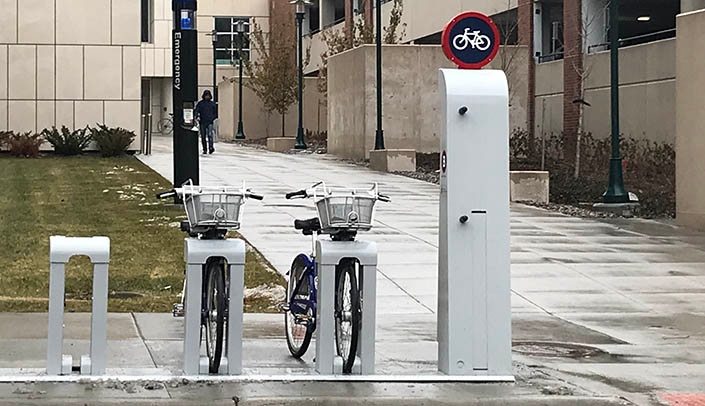
by Tina Spencer
Have you seen the new B-cycle stations on campus? As part of an expansion to the B-Cycle network, four Heartland B-cycle stations were added to our campus last week. Station locations were determined by a campus-wide survey:
44th & Farnam, by Doctors Building North drive
Fred & Pamela Buffett Cancer Center drive entrance
Lot 15, between Student Life Center & Maurer Center for Public Health
42nd & Dewey, next to bus shelter on SE Corner
Heartland B-cycles are available for anyone to use. If you’re looking for a way to add some activity to your day or to get from one place to another on campus or in the community, the B-cycles can be checked out at your convenience. You can buy a monthly pass at the station or the B-cycle mobile app. All passes include unlimited 1-hour trips that start when you check a bike out of one station and end when you return it to any other station in the system. Additional options are available.
Bicyclists are required to follow the same rules of the road as motorists, should abide by state bicycle laws, and are encouraged to wear a helmet. Our campus is connected to the Field Club Trail which connects to the Keystone Trail and the rest of the Papio Trail system.
B-cycles are another form of active transportation with many benefits—studies have shown that biking also has many health benefits, both physically and mentally, and daily exercise helps relieve stress and anxiety. With your membership, you can track your distance ridden, estimate calories burned and calculate the carbon emissions you have offset by choosing to commute using a bicycle instead of your car. If you choose to do so, make sure you get the other free benefits associated with TravelSmart!
The Heartland B-cycle expansion means there are more than 70 stations right here in Omaha, from Aksarben to the River’s Edge Park, as well as Chalco Hills. Whether you need to head west and go to UNO or east to Blackstone, Midtown or Downtown, there’s a B-cycle station conveniently located to get you there. Hungry for lunch but don’t want to use all your time to walk to your parking lot and drive a block or two? Check out a bike at a station near you and burn off some extra calories before and after lunch.
Exciting Changes at Nebraska Café
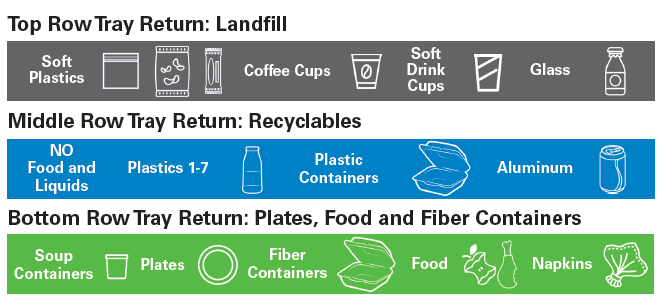
Last year Sodexo took the last step in eradicating Styrofoam from all of their restaurants and cafés on campus, as requested by diners, by changing to compostable clamshell to-go containers.
I’m excited to tell you that user feedback has also helped with the introduction of reusable plates for dining in the Nebraska Café. If you are taking your food to go, please continue to use the to-go containers; reusable plates are not to leave the Café.
Reusable plates are available at the salad bar and you can ask your café server for a reusable plate at all other food stations. In addition to improving your dining experience in the Nebraska Café, these plates will reduce waste and keep costs lower.
While visiting the Nebraska Café you may have also noticed a change to the tray return area. To help support the reusable plate program, ensure items left on the tray return are recycled, and prep items for composting (we aren’t composting yet, but we’ll let you know), we are asking users to help sort the materials they place on the tray return.
We are asking you to sort items into three categories:
- Top level: Landfill; soft plastics, coffee/soda cups, glass
- Middle level: Recyclables; plastics 1-7, plastic containers, aluminum or tin cans
- Bottom level: Reusable plates, fiber to-go containers, any food waste, napkins.
There are table tents in place to help you prep your items, and graphics next to the tray return to help when you get there—see the picture above.
Many of us like to compact our trash before we leave the table—you know, you stuff your saran wrap and your banana peel into your yogurt cup—but resist that urge! Those three items will got on the three different levels at the tray return.
The café sorters behind the tray return are really busy (did you know the Nebraska Café serves over 6,000 meals a week??) and they don’t have time to take everything apart to sort it. By sorting items on the tray return, you are helping to decrease your waste and the waste on campus.
Thank you for your help with this new initiative. If you have questions about where to place a particular item, please post a comment here or email LiveGreen@unmc.edu If you have other comments, please submit them via the comment cards in the café, near the condiment station.
A Happier, Healthier Holiday Season
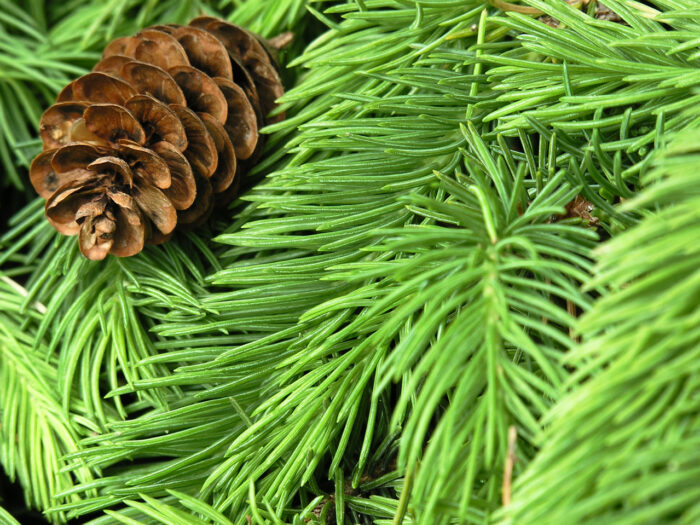
Americans continue to say they would prefer to reduce the focus on gifts during the holidays, with a recent survey showing 69% would agree to forgo gifts entirely so they could save money and spend more time with loved ones. Even if that’s the desire, the reality is that consumption is still a focus, and this causes waste to increase by 25% (1 million tons/week more to landfills) between Thanksgiving and New Year’s. Not really surprising when you start thinking about all the shopping, eating, and traveling.
Seemingly little actions add up and there are lots of things you can do to reduce your waste and have a happier, healthier holiday season:
- Reduce the focus on gifts and concentrate on the things that really matter, especially your sanity.
- If you exchange gifts, consider buying experiences, like museum/zoo membership, or make donations instead of buying stuff. If you do buy gifts, look for locally made items.
- Consolidate your shopping trips to save gas, take reusable bags, consolidate online shopping to save on shipping, and look for products that contain recycled content and responsibly sourced materials.
- Wrap gifts in reused materials. If every American household wrapped 3 gifts in reused materials (brown paper, maps, Sunday comics, cloth bags, cereal boxes) enough paper would be saved to cover 45,000 football fields! For everything else, use recycled content paper and reusable gift-bags, boxes, and bows.
- Recycle old lights to help local groups and replace them with new, efficient, LED lights, which use 70% less
- Hosting? Buy food in bulk to reduce packaging waste, but menu plan to reduce food waste, and serve with reusable plates/cups/utensils/napkins.
- Make it easy for guests to recycle, and recycle everything you can’t reuse.
- Consider sending E-cards; saving trees, your time, and money. Recycle or reuse any cards you receive for decoration, future gift tags, or craft projects.
- If batteries are needed, buy rechargeable—they’ll save you money and trips to the store in the long run. Recycle single use batteries.
- Check your thermostat: more people and more cooking means the temp can be lowered. Every 2 degrees lower saves $100 a year, saves the equivalent carbon emissions as driving a car 3,000 miles, and people get to be comfortable in their (reused) ugly Christmas sweaters.
- Reduce junk mail by contacting Catalog Choice to remove your name from marketers’ databases.
- Instead of a cut tree, buy a live tree to decorate that can be planted in your yard once the holiday season is over. Dig the hole now, before the ground freezes.
- If you buy a cut tree, leave it in your yard for birds during the winter and then compost, or take it to the city’s recycling sites.
Wish-cycling
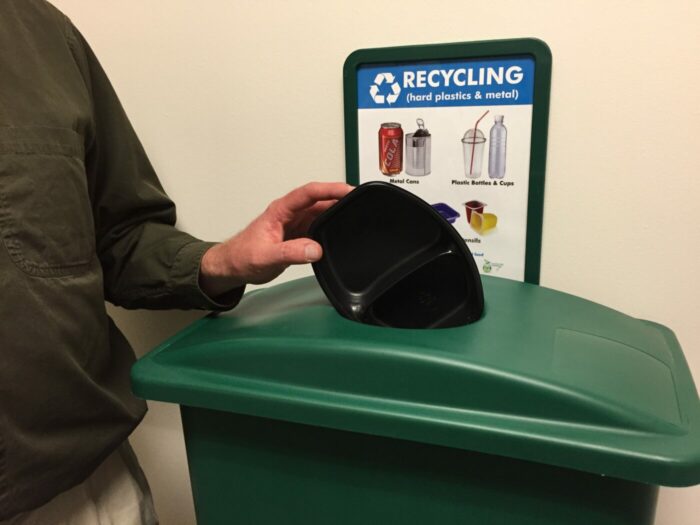
November 15th is America Recycles Day, a nationally recognized day dedicated to promoting recycling, and buying recycled products.
America Recycles Day is easy to celebrate because it takes no preparation. If you’re finished using a product and it is recyclable, then put it in the correct recycling bin—that’s all there is to it!
Not sure what to recycle on campus? Watch this short video to find out, or visit our webpage for on-campus information. Check out the Wasteline site for recycling information in and around Omaha.
It’s more important than ever Recycle Right! Make sure you recycle items in the correct containers. This reduces contamination, which could send the entire load to the landfill, while ensuring that everything in the bin can be recycled.
Don’t be a “wish-cycler”! Wish-cycling is the common, but damaging process of intentionally placing questionable items into a recycling bin, in the hopes it will be recycled. Those of us that care the most about recycling are some of the worst offenders. We desperately want to believe that the item can be recycled or that they will find a way to do so, but it actually creates more problems: sorting machines get clogged or broken, which takes time/money to fix, it’s more time consuming for hand-sorters, and it creates more waste! It also costs us (wastes) an average of $250,000/year.
Recycling is important and has huge impact on our planet and our economy. In order to complete the loop and make sure your recycling effort has value, buy products made of recycled content. When you purchase a product take a look at the label. If it contains the 3-arrow triangle (often referred to as the recycle symbol) it is recyclable. If that triangle is inside in a circle, that product is made from recycled content. The package should tell you percentage of that item that was made from recycled materials, and if the materials are “post-consumer content.”
Post-consumer means the material came from the end-user and that material would have otherwise ended up in the landfill, like cans, newspaper, or plastic bottles. Pre-consumer/industrial content is still recycled material, but was produced during the production of another product, e.g. wood chips, sawdust, and glass or metal shavings.
Recycled content product diverts materials from the landfill while protecting new or virgin resources, so make sure what you are buying has the highest percentage possible of recycled content.
Doing some “fall cleaning” and have items that aren’t meant for the recycling bin? Reusing is always better than recycling! Donate clothing, warm weather gear, and toiletries to people in need, and local charities will take other household items.
Cenergistic Energy Specialists Have Arrived
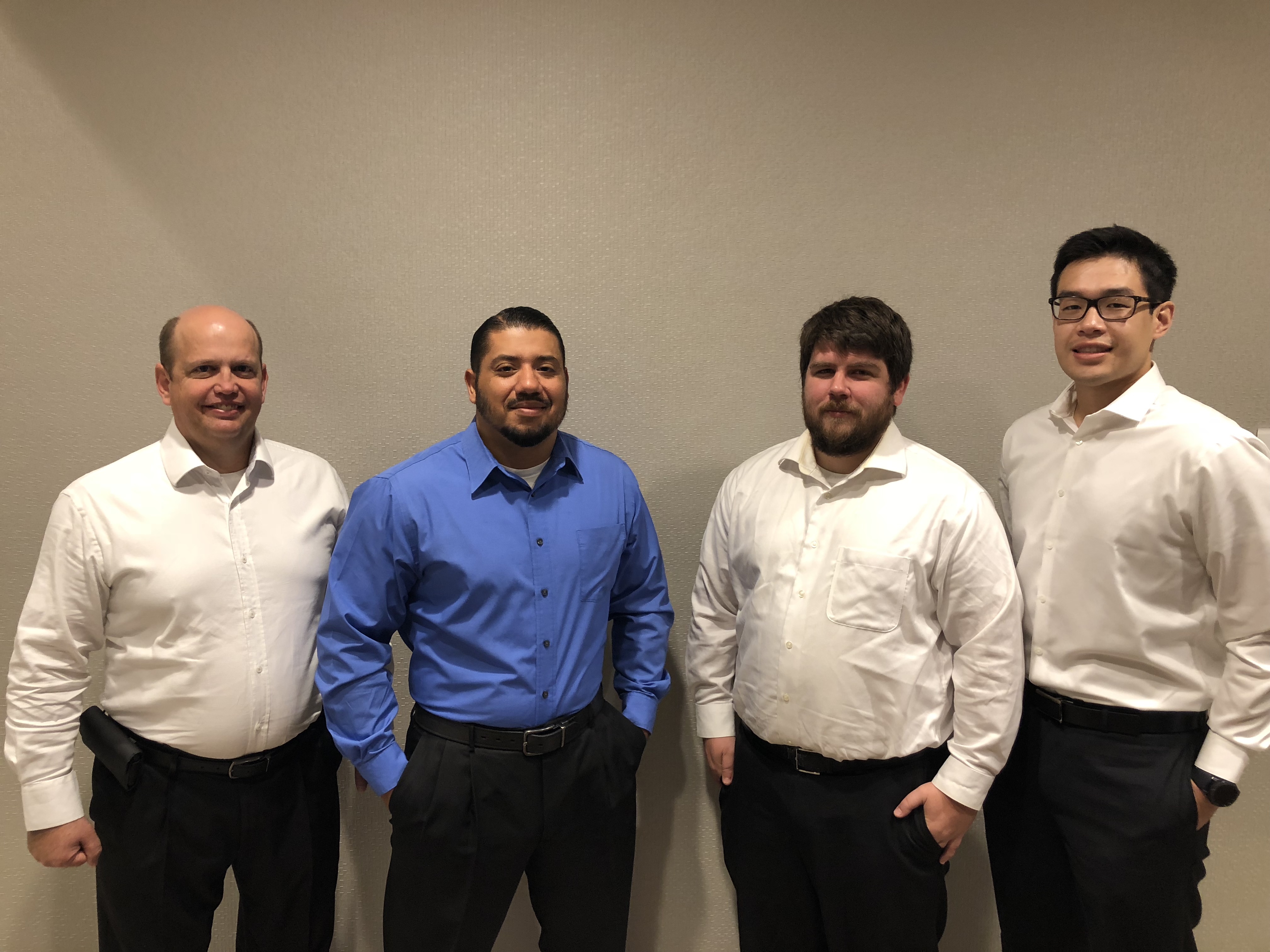
Left to Right: Jon Hilton, Art Dominguez, Blaine Richter, John Khong, not pictured Nicole Mattson
Last month, University of Nebraska President Hank Bounds, Ph.D. announced a five-year partnership with Cenergistic, aimed at finding energy savings across the campuses through technology- and behavior-based strategies that will help maximize NU’s use of its facilities and equipment. Nebraska Medicine agreed to the same five-year partnership so the entire Med Center campus can be optimized.
“Campuses have done an excellent job of enhancing sustainability over the years, but we can always do more to be better stewards of our environmental resources,” Dr. Bounds said. “We’re excited to have Cenergistic on board to help us think through how we can be an even more sustainable and more innovative university.”
A team of Cenergistic engineers and conservation experts are on-site now, working with facilities to gather information about space and energy use in the university’s buildings. That includes, for example, building temperatures, use of lights, space utilization and other information.
Cenergistic, will recommend guidelines aimed at improving energy conservation and cutting costs. Guidelines will be vetted by campus leadership and will take into account, for example, the unique energy and space needs of research facilities, the hospital, and others factors.
In addition to the engineers and conservation experts, there will be Omaha-based energy specialists in specific spaces—offices, auditoriums, hallways, conference rooms to see how those spaces are performing, verifying data, and sometimes speaking with the occupants to learn how the space is used. They will also be in buildings at night, as unoccupied spaces should be using much less energy than they do during the day.
The energy specialists are Blaine Richter, Nicole Mattson, and John Khong and will be led by Jon Hilton and Art Dominguez, all seen in picture above.
Cenergisitc will also deploy data-logging devices in many spaces, to not only verify what the system says is going on, but also to look at what is happening on one end of the room compared to the other. These devices will only monitor temperature, humidity, and light levels. Please do not touch, move, or interfere with the data-loggers.
Buildings will be notified prior to any data-logger installation. The first buildings to be surveyed will be some annex buildings and then some of the education buildings.
All Cenergistic personnel have undergone campus safety and privacy training, background checks, required screening, and will have med center issued photo ID badges. If you have any questions or concerns, please contact LiveGreen@unmc.edu
A Happier, Healthier Holiday Season
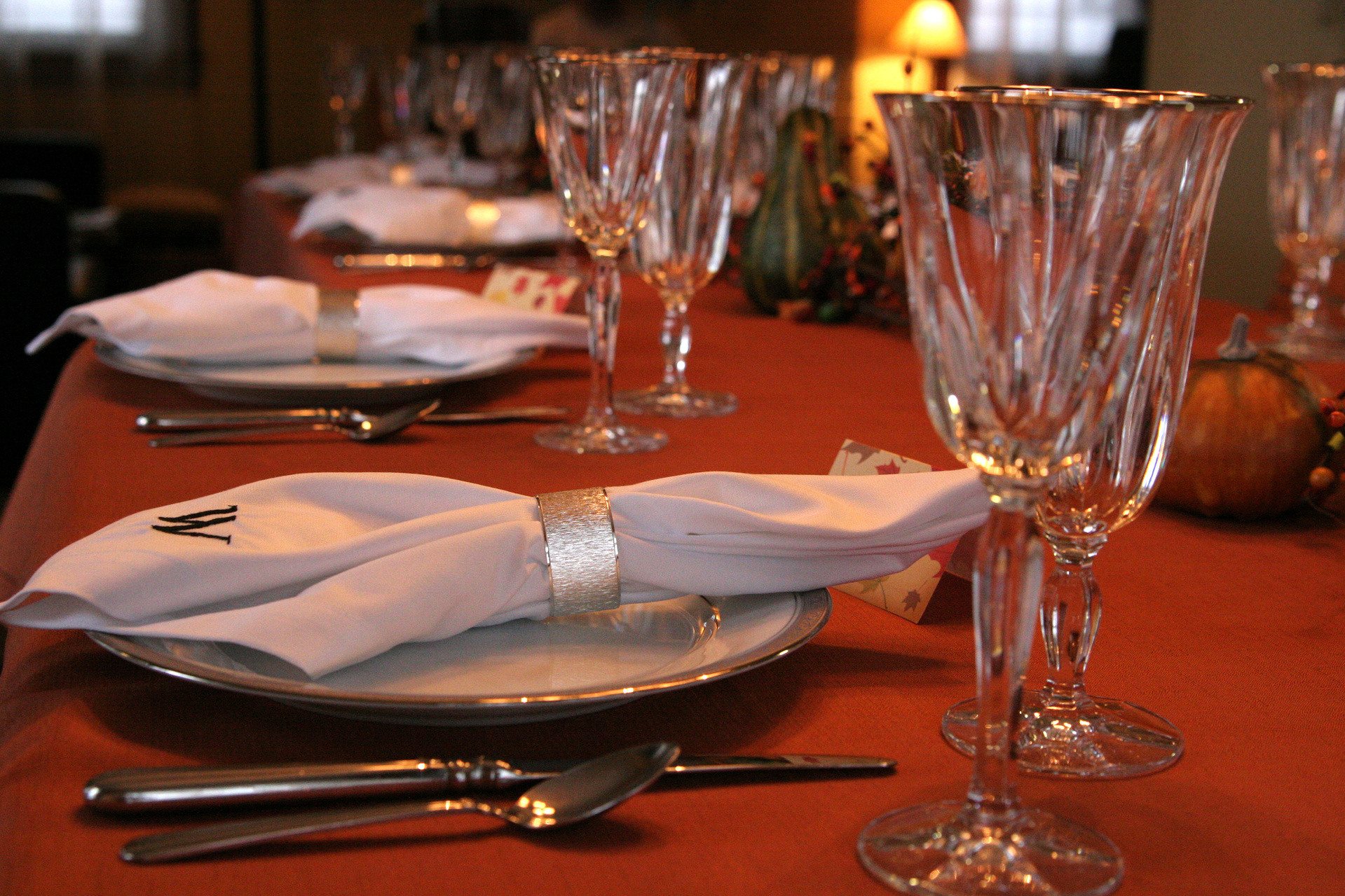
Americans continue to say they would prefer to reduce the focus on gifts during the holidays, with a recent survey showing 69% would agree to forgo gifts entirely so they could save money and spend more time with loved ones. Even if that’s the desire, the reality is that consumption is still a focus, and this causes waste to increase by 25% (1 million tons/week more to landfills) between Thanksgiving and New Year’s. Not really surprising when you start thinking about all the shopping, eating, and traveling.
Seemingly little actions add up and there are lots of things you can do to reduce your waste and have a happier, healthier holiday season:
- Reduce the focus on gifts and concentrate on the things that really matter, especially your sanity.
- If you exchange gifts, consider buying experiences, like museum/zoo membership, or make donations instead of buying stuff. If you do buy gifts, look for locally made items.
- Consolidate your shopping trips to save gas, take reusable bags, consolidate online shopping to save on shipping, and look for products that contain recycled content and responsibly sourced materials.
- Wrap gifts in reused materials. If every American household wrapped 3 gifts in reused materials (brown paper, maps, Sunday comics, cloth bags, cereal boxes) enough paper would be saved to cover 45,000 football fields! For everything else, use recycled content paper and reusable gift-bags, boxes, and bows.
- Recycle old lights to help local groups and replace them with new, efficient, LED lights, which use 70% less
- Hosting? Buy food in bulk to reduce packaging waste, but menu plan to reduce food waste, and serve with reusable plates/cups/utensils/napkins.
- Make it easy for guests to recycle, and recycle everything you can’t reuse.
- Consider sending E-cards; saving trees, your time, and money. Recycle or reuse any cards you receive for decoration, future gift tags, or craft projects.
- If batteries are needed, buy rechargeable—they’ll save you money and trips to the store in the long run. Recycle single use batteries.
- Check your thermostat: more people and more cooking means the temp can be lowered. Every 2 degrees lower saves $100 a year, saves the equivalent carbon emissions as driving a car 3,000 miles, and people get to be comfortable in their (reused) ugly Christmas sweaters.
- Reduce junk mail by contacting Catalog Choice to remove your name from marketers’ databases.
- Instead of a cut tree, buy a live tree to decorate that can be planted in your yard once the holiday season is over. Dig the hole now, before the ground freezes.
- If you buy a cut tree, leave it in your yard for birds during the winter and then compost, or take it to the city’s recycling sites.
Fall EcoChallenge Results
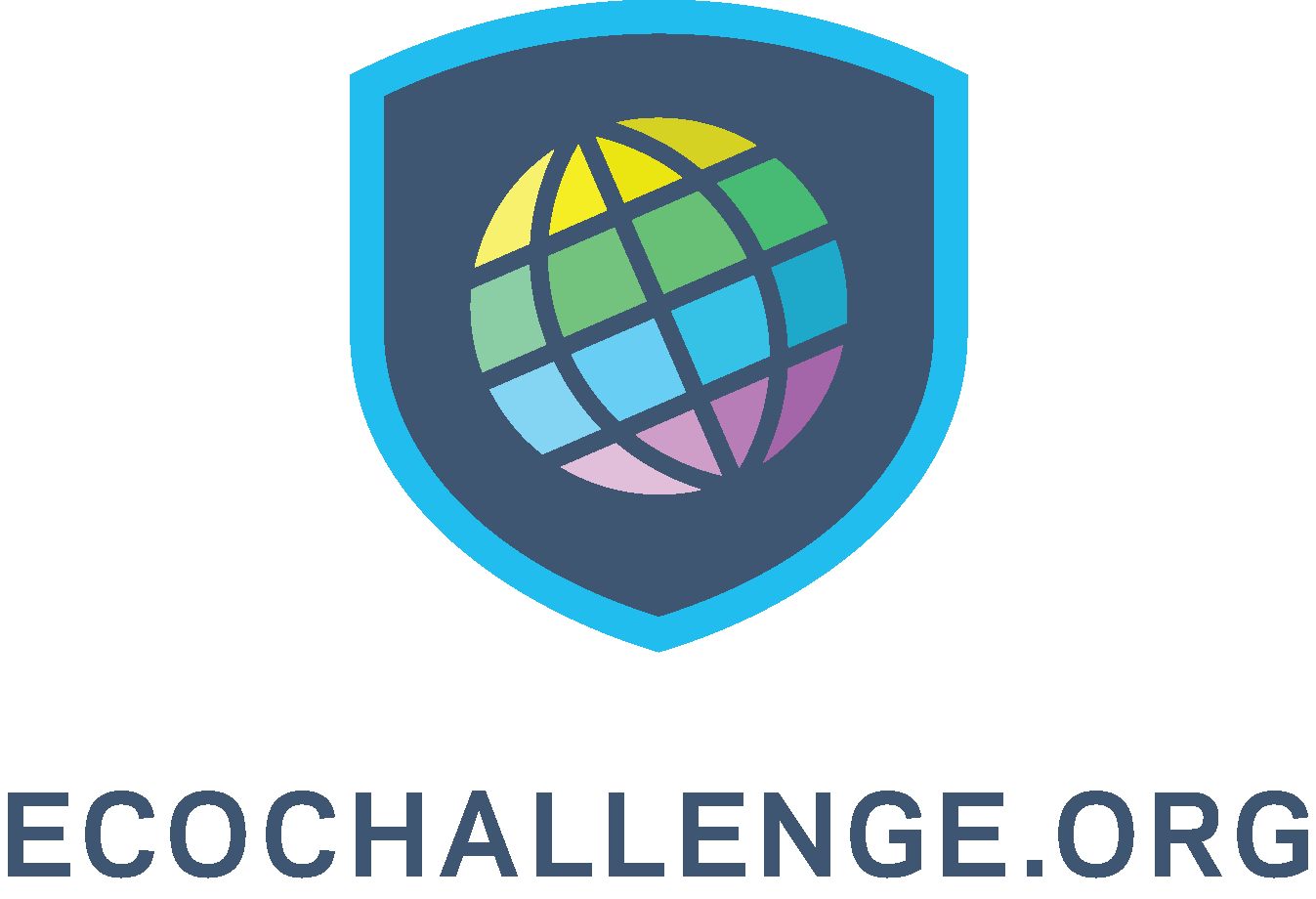
As October comes to an end, so does the fall EcoChallenge. In case you missed it, the EcoChallenge is hosted by the North West Earth Institute, and is a 21 day challenge encouraging participants to learn about sustainability topic areas that interest them, while taking measurable action, having fun, and encouraging others. Individuals earn points, can win prizes, and get to see how these three weeks of learning and/or actions add up to make meaningful change—in our community and around the world.
We were especially excited this fall, as the category of health was added to go along with waste, food, transportation, energy, community, nature, water, simplicity, and you could create your own. As you hopefully know, health and sustainability are directly connected. Not only is having clean air, water, and food integral to your health, doing things like eating more vegetables, using active transportation, and reducing waste are better for you and the environment. This is how sustainability helps us to meet our mission.
Participants selected a limited number of daily activities, including but not limited to eating meals without any form of technology, exercising, refusing single use plastics, or eating meatless meals. They could also select a number of one-time activities including getting an annual physical, watching informational videos on topics, telling others, or buying carbon credits.
This fall the UNMC/Nebraska Medicine team decided to challenge the UNO team. I am happy to report that we won! We put up 15,332 points and placed 40th out of the 842 teams participating. UNO had 13,519 points and finished in 47th place. Had we combined teams, as we did in the spring, we would have been in 16th place!
Speaking of combined effect, our team had an impressive impact. With all the options I can’t list them all, but we saved 1,475 gallons of water, got an additional 855 minutes of sleep, spent 6,220 minutes exercising, ate 227 extra servings of fruits and vegetables, and prevented 223 plastic bottles, 157 straws, and 183 disposable cups from going to the landfill.
Great job team!!
If you missed the EcoChallenge, they’ll be another in the spring. In the meantime, you can have your own impact—pick a sustainability related topic you’d like to know more about or improve/change and challenge yourself (or your friends/family??) to learn more about the topic or make the specific change on a daily basis.
Why We Recycle
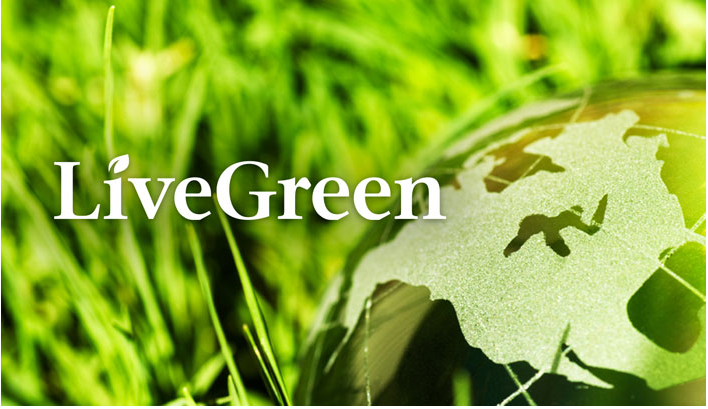
Many people think of recycling when it comes to being sustainable—and it is an easy, first step. Goods are turned back into products so new resources don’t have to be used while simultaneously preventing sending that same material to the landfill. Reducing and reusing are better than recycling, but there are times when that’s not possible, so recycling is then the way to go.
Did you know the EPA estimates 75% of what Americans throw away is recyclable? Unfortunately the national average of materials diverted from the landfill is only 34% and Omaha is a shockingly low 11%. The Med Center has improved to 27% but we still have some work to do to get to the 90% (zero waste goal.
Have you ever wondered what impact your recycling has? It seems like such a simple action and a small item, can it really have a big impact? Yes! Your aluminum can is one of the 6,700 cans used every second and 200 billion used every year. It takes more energy to mine and produce aluminum than any other metal, yet we landfill enough to provide the auto industry with all the material it needs to build a year’s worth of new cars, which is valued at $1 Billion. However, recycling uses only 5% of the energy needed to create the same can from mined aluminum and they can be back on the shelf in 6 weeks.
Plastic is no better. Americans throw away 25 million bottles every hour. New production uses crude oil and other chemicals leading to pollution which has a negative impact on health including reproductive issues, obesity, cancer, lung diseases and endocrine issues. Researchers are now seeing long term effects in children when they are exposed to pollution. In short, recycling helps reduces harmful pollutants which are bad for our health. To meet our mission of leading the world in creating a healthy future for all, we must reduce, reuse, and recycle.
Changes in the international recycling market means that it is more important than ever to Recycle Right. Please make sure all materials are placed into the correct bin and liquids/food have been removed. If you have questions on what can be recycled, see our website or watch this short video
Other items can be recycled at the Med Center; including aerosol cans, furniture, electronics and toner cartridges. For more information see the LiveGreen Recycling page.
